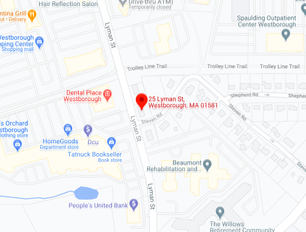Clinician Spotlight: An Interview with Jill Walden, LICSWLauren Chapin, LICSWWelcome to the second installment of Clinician Spotlight, a series where I sit down with some of our wonderful therapists for a cozy conversation about work, mental health, and many life tidbits in between. This month, it was a joy to chat with Jill Walden, LICSW, Castlebrook’s newest addition to the team. Jill and I caught up over Zoom where she described what being a clinician at Castlebrook has been like, the rewards of being a therapist, and of course, which video game she winds down with after her work day.
******** Lauren: Jill, you’re fairly new to the team at Castlebrook! What has your experience been like so far? Jill: It’s been wonderful. I hadn’t done individual therapy before, and I was more accustomed to family therapy and different clinical settings, so I was really excited to get into the individual space. I’ve enjoyed the opportunity I’ve had here to be able to expand, learn new things, and build my own unique practice. Being able to settle in and take things at my own pace has been great. I can’t imagine a more positive experience starting out and I think anybody would be happy working here! Lauren: It sounds like you’ve been able to begin carving out your own niche and exploring what individual therapy means to you. What have you found to be some of the most rewarding parts of being a therapist? Jill: An especially rewarding part of being an individual therapist, in comparison to some of the other roles I’ve been in, has been seeing a client’s growth over time and feeling like I’m part of that growth. I love being able to help and be the agent of change for a client. To hear somebody say, “I really thought about this thing you said” is rewarding because I don’t always expect that what I say will stick! Even if they don’t tell me though, it feels good to be a listening ear and a safe space, especially when many people don’t have that space in their own lives. Lauren: How would you say your clinical style has evolved since you began your individual work? Jill: It definitely depends on the person. I lean towards CBT (cognitive behavioral therapy), ACT (acceptance and commitment therapy), and I would love to learn more about DBT (dialectical behavior therapy). Underlying all of these modalities is the ability to be mindful, build self-awareness, and look at how we are thinking about a situation and try to adjust that thought process. Positive self-talk, being able to see ourselves in a new way, and changing the narrative of how we’re relating in the world are also important. I help people identify where they want to be and then help them get there. We problem solve in a way that’s meaningful to a client and build on what they’re already doing to reach success. I hope to continue to learn and add to my toolbox as I go. Lauren: So Jill, I know that something that makes you unique is that you really enjoy gaming! What is your favorite video game and how would you say gaming factors into your self-care? Jill: I actually have a list ranking my favorite games [laughs]. My favorite games of all time are Fire Emblem: Path of Radiance and Radiant Dawn. They are tactical strategy games and they’re my favorites in part because of the memories of playing alongside my siblings. They’re very story-driven as well which leads into why games are so important to me and what I get out of them–I’m all about the story it’s telling. I liken it to reading a book or watching a movie, but instead you’re experiencing it and going along for the ride. It’s escapism in a positive way–for enjoyment. Another series that is very important to me is Legend of Zelda. Lauren: What would you tell a client about the importance of hobbies and how they factor into mental health? Jill: As a society we put so much value on overworking ourselves and adulting is hard [laughs]. We need space to express ourselves, relax, and feel like we’re working towards something outside of our career. Hobbies for me are something to feel excited about at the end of a long day. For those of us that are lucky to like the work we do, hobbies are a great addition, but many people work in situations that are not their dream job and in that case, hobbies can fill that void of needing to feel enjoyment and passion. Lauren: Shifting gears a bit back to the therapy sphere, what is your favorite therapeutic metaphor or phrase? Jill: Two of them come to mind. The first is the idea that when you are on an airplane and there is a moment of need, the oxygen masks drop down. It’s important that we put our own oxygen mask on first before assisting anyone else; metaphor being that we have to take care of ourselves in order to take care of others, which can be very hard. A second metaphor is that learning new therapeutic skills is like learning a new instrument. It’s clunky at first and it takes time to do well. You have to intentionally practice every day, even when you don’t want to. Lauren: Who have you been looking up to in the field recently? Jill: I have two answers. One is Dr. Russ Harris who is an ACT trainer and author of the book The Happiness Trap. I really appreciate his frankness and his expansion of ACT material to make it more accessible. Next, much more locally, is Kerrie Toole [laughs]. It’s incredible to see the business she has created and she is such a help to all of us. If I can channel even a fraction of her energy, passion, and commitment, I would be happy. Lauren: Last question, what would tell a parent whose child is nervous to come to therapy? Jill: I would validate that, yeah, talking about your feelings is hard, especially to a stranger. With kids, I pretend that I’m a “feelings doctor” and make the connection for them that they go to the primary care doctor to get better medically and that “the feelings doctor” is there to help them work on their emotions in order to feel better. Lauren: I love that. Thank you for sitting down to chat with me Jill, I can’t wait to see where your career in individual therapy takes you!
0 Comments
Your comment will be posted after it is approved.
Leave a Reply. |
Archives
May 2025
Categories |
Mission Statement
Castlebrook Counseling Services, Inc. is a group of private practice clinicians with a shared goal of strengthening our community by providing therapy and clinical support designed for children, adults, and families to successfully meet life’s challenges.
 RSS Feed
RSS Feed

